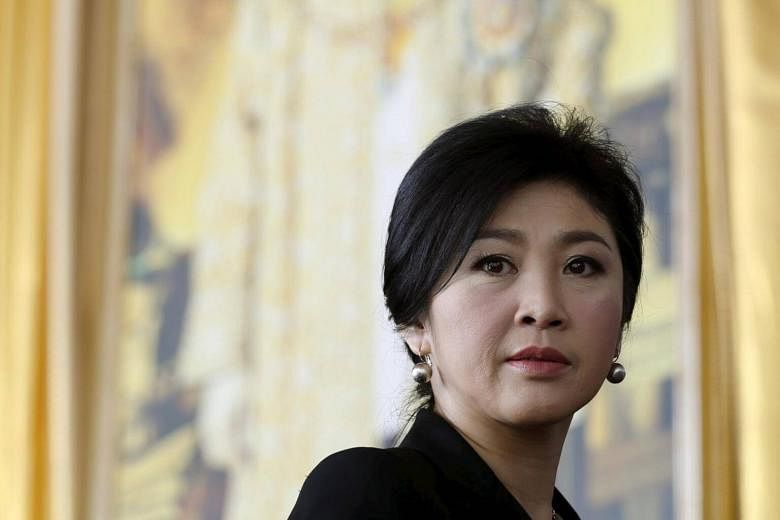BANGKOK (AFP) - Thailand's first female premier Yingluck Shinawatra followed her brother to the apex of the kingdom's political scene and will now depart it in a similar fashion: condemned to self-exile after a court handed her a five-year sentence in absentia.
Assailed by protests, a coup and now a prison sentence, Yingluck is the latest member of the Shinawatra clan to fall victim to an army-backed establishment that loathes her family.
After a lengthy trial under junta rule, Bangkok's Supreme Court on Wednesday (Sept 27) convicted Yingluck of negligence over a rice subsidy policy that was riddled with graft and cost the state billions of dollars.
But the former premier was a no-show, having pulled a dramatic Houdini act one month earlier when she slipped out of the kingdom ahead of the scheduled verdict.
Yingluck has yet to emerge publicly but sources say she joined her brother Thaksin Shinawatra in Dubai, where the fellow ex-premier has kept a home since he fled his own corruption conviction in 2008.
The jail sentence makes it highly unlikely Yingluck will ever return home, spelling the end of a tumultuous six-year innings that saw her rise from political novice to premier.
Propelled to power in July 2011 by her family's electoral base in the poor north and north-east, Yingluck was pilloried as a political lightweight armed with little more than a winning smile and a hotline to her elder brother - who once referred to her as his "clone".
But she stepped out of his shadow, displaying an unexpected resilience as protesters besieged her home and opponents clobbered her with a raft of court cases.
"I think that she learnt very fast and adapted herself very well... she is very determined to do her duty," Chaturon Chaisang, a veteran politician and former cabinet minister in her toppled government, told AFP before the court ruling.
"But she might not have understood what was going to happen to her... that she would become the victim of a political game." .
TEARS AND SMILES
The former businesswoman drew hordes of supporters whenever she toured her electoral heartlands, taking endless selfies and being showered with red roses.
Her campaigning strategy - dubbed fighting with smiles - and her propensity to shed tears in public forged an image far removed from that of the stern junta generals who ousted her from office in a 2014 coup.
In private she wielded authority among her party and entourage, in a country where deference is expected towards wealth and power.
Her weakness was her elder brother Thaksin, whose deep networks hoisted her to power despite his long absence from Thailand.
The billionaire telecoms tycoon has lived in self-imposed exile since 2008 to avoid jail in Thailand for corruption convictions.
He was ousted as prime minister by an army coup in 2006, which opened a seemingly unbridgeable chasm between his supporters and enemies.
Yingluck's premiership was scuttled in 2014 by a court ruling over a technicality.
Weeks later the army shunted aside the rest of her administration.
For her first two years in office, the outlook seemed very different.
The photogenic former businesswoman charmed many of her critics and for a period maintained the peace across Thailand's bitter political divide.
She reached out to the military and worked to appease political opponents within Thailand's Bangkok-based establishment, which loathes Thaksin and wants to curb the Shinawatras' 13-year influence on Thai politics.
But the shaky truce collapsed in November 2013 after a failed bid to pass an amnesty bill which would have enabled Thaksin's return.
The move outraged government opponents who flooded the streets for months-long protests marked by violence that left dozens dead and hundreds wounded.
Yingluck became the focus of caustic - and often explicitly sexist - tirades by protest leaders.
But the mother-of-one refused to joust with her detractors and held off on a violent crackdown.
She took a leaf out of Thaksin's playbook, launching lavish welfare schemes aimed at the rural poor, including the rice subsidy programme.
The bungled scheme was a lightning rod for anger among protesters and also became her ultimate undoing after the court deemed her guilty of failing to stop corruption.
Yingluck, who graduated in political science before earning a master's degree in business administration in the United States, spent much of her career working in her brother's empire.
Rising from trainee status, she eventually became president of the mobile telephone unit of Shin Corp, the telecoms giant founded by Thaksin that was at the centre of a tax scandal in 2006.

